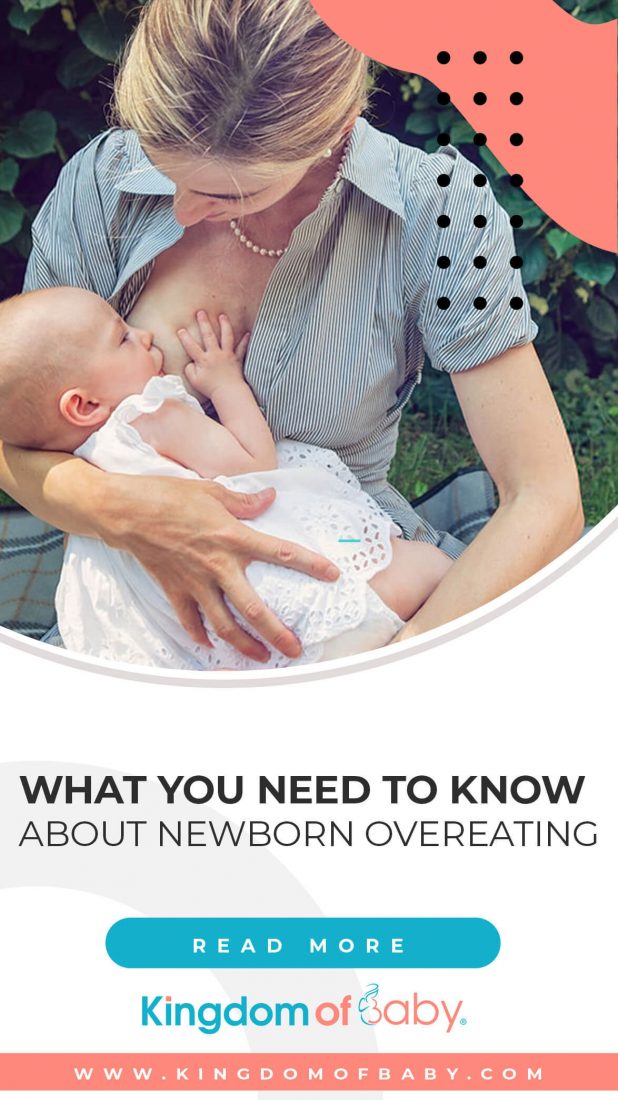
As a mom, you will make sure that you are giving enough nutrients necessary for your baby’s health. Whether it is breastfeeding or formula feeding. You would agree that a well-fed baby is a healthy baby. You would love to see your baby with those adorable fluffy cheeks and chubby thighs. However, did it ever cross your mind that you might be overfeeding your baby? Of course, he will not be able to tell you if he is already full or if he had already enough. Note that childhood obesity is on the rise so proper nutrition should be taken into consideration at the earliest stage. So, is newborn overeating may be possible? Should you be concerned about it? What are the tips to know if your baby is getting the right amount of food? What are the hints of newborn overeating? Know every single thing about it by reading this Kingdom of Baby post!
What are the causes of newborn overeating?

Reasons that lead to newborn overeating may include:
- Feeding milk or formula with the use of a bottle.
Babies who are fed on formula are more likely to have a higher risk of newborn overeating for the fact that formula milk is commonly fed through bottles. Babies keep getting a continuous leak of milk regardless of being full because bottles let a free flow of milk. Bottle-feeding parents may try to shove their baby to completely consume a bottle.
- Large feeding bottles.
Based on a study, a baby who fed on a larger feeding bottle is often overfed and therefore tends to gain weight and be overweight. Pushing the baby to finish an entire bottle, not minding its size might be the cause of newborn overeating and furtherly, obesity.
- Using a feeding bottle as a pacifier.
Babies will surely throw tantrums, that’s their nature, right? With this, some parents might use a feeding bottle as a way to calm their baby down to give them more food than they ever need. You can use a pacifier to settle a grumpy baby down to avoid giving him more milk.
- Persistently persuade the baby to feed.
A baby can give you hints when he is already full. Some cues may include turning away from the nipple or not sucking at the nipple of the bottle. Some parents may persistently push their baby to feed by putting the nipple in their mouths over and over again, persistently overfeeding them.
- Introducing solids sooner.
It is recommended to start giving solids to your baby at the age of four months. Introducing solid foods sooner can lead to a baby to eat more than the amount of food their body needs. This only means overfeeding.
There are times that parents may not be aware of their newborn overeating. In this case, it is essential to learn about the signs of newborn overeating. Read further to know about it.
What are the hints of newborn overeating?

Newborn overeating may show the following signs:
- Loose poop – The number of diapers with loose poops increases.
- Spitting repeatedly – Though in general, babies spit but may do more often when they are overly fed.
- Gas and bloating – Feeding on the bottle may cause the baby to swallow a lot of air, and can make his tummy to be bloated leading to discomfort.
- Suffering from more colic than usual – All the passing of loose poops, bloating, and gas will make your little one suffer from a lot of discomforts. This can lead him to be a colicky baby.
- The insistence of more than 32oz of breastmilk or formula milk daily – Even those who are already a year old don’t demand more than thirty ounces of breast milk or formula in a day. According to the American Academy of Pediatrics (AAP), a newborn requiring more than thirty-two ounces of breast milk or formula in a day is not usual and must be consulted to a doctor. Though, a little over thirty ounces may not be abnormal.
Those are the common hints of newborn overeating that can be apparent during feeding, and disregarding them may lead to some complications.
What are the possible complications of newborn overeating?
Constant newborn overeating can lead to the following complications.
- Vomiting – Overeating babies may vomit after breastfeeding or formula feeding. This may lead to health complications in the long run as this practice let pieces of foods to be left in the stomach to digest.
- Overweight and obesity – Babies who are overfed get excess calories that are gathered in the body and may cause abnormal weight gain since they constantly consume excess food.
- Worsens acid reflux – A baby who has acid reflux or gastroesophageal reflux disease (GERD) can suffer from a worse condition because of overeating. They will possibly display downturn symptoms when they start to overfeed.
How can you prevent newborn overeating?

You can enforce the following tips to prevent newborn overeating.
- Breastfeed
According to experts, the chances of overeating reduce when the baby is fed through the breast. Even if the baby stays long on the nipple after he eats, he will not get continuous milk supply as he does in feeding bottles. The reason is, the baby gets milk only from sucking.
- Keep up a feeding schedule
The baby may adjust when there is a feeding schedule. Each day, the baby will get hungry at the same time, until then he can be fed on time. This will prevent feeding more than usual with each long intervals.
- Do not feed the baby forcefully
Keep away from forcing your baby to feed if he is already full to prevent him from overeating.
- Hang on for the hunger signs
Look for hints of babies’ hunger such as moving their lips when gently touched or sucking at their fingers. A baby who is already hungry will voluntarily latch on the nipple immediately. That is why only feed them when they are craving.
Newborn overeating should be a concern, but can easily be prevented by coming after some proper feeding methods. You can freely refer to the information above and give us some feedback below!
Read also:
- How Important Toddler Feeding Schedule is?
- 9 Best Breastfeeding Books Every Mom Should Read
- Overactive Letdown During Pregnancy: How to Deal With It?


